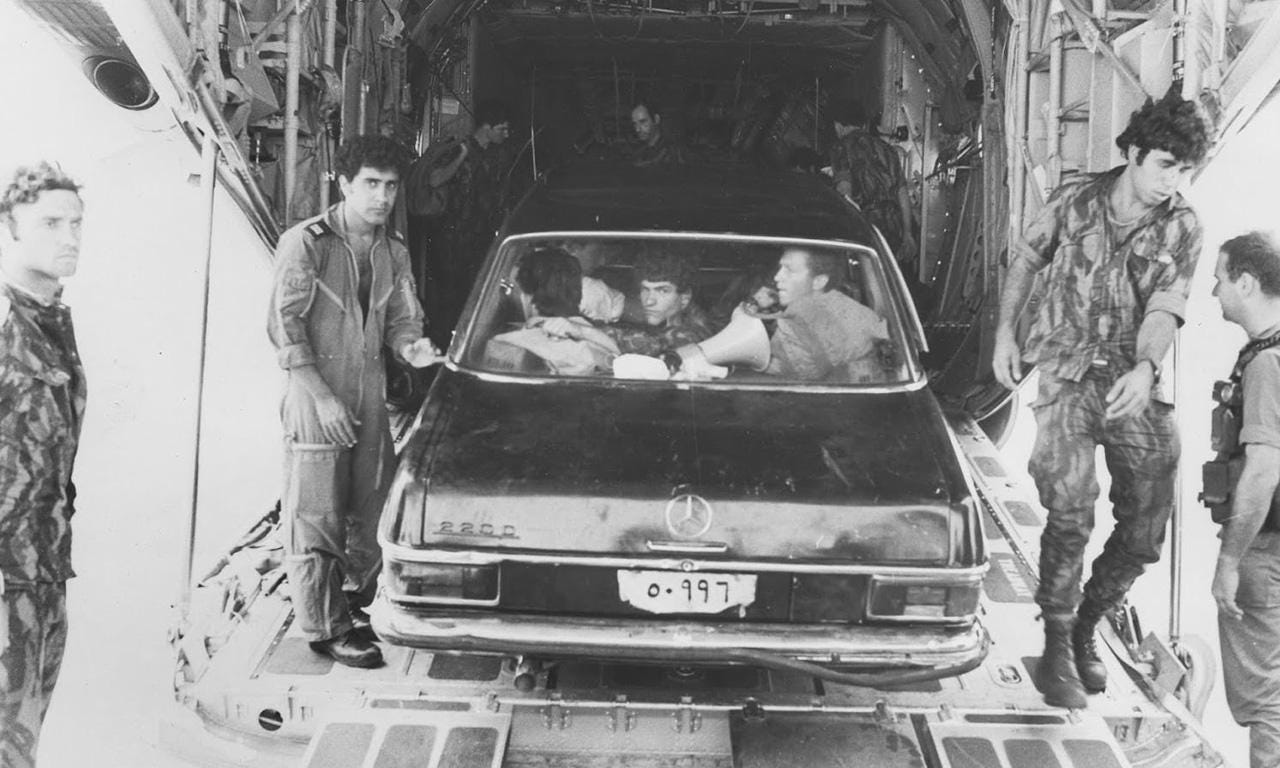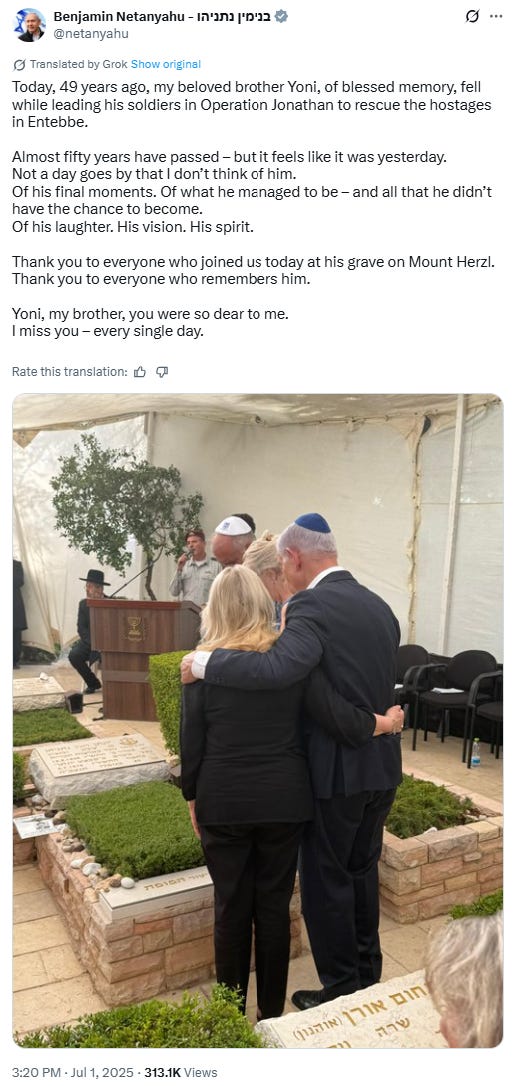Hijacking
July 4, 1976, is remembered as the day when the world witnessed an extraordinary miracle: a daring operation executed with precision and courage by the Israel Defense Forces at Entebbe, Uganda. Known as Operation Thunderbolt, it remains one of history's most audacious rescue missions and serves as a powerful reminder of Jewish resilience, bravery, and the enduring capacity for miracles.
On June 27, 1976, an Air France flight from Tel Aviv carrying 246 passengers, mainly Jewish and Israeli, was hijacked by Palestinian and German terrorists, and soon diverted to Entebbe Airport in Uganda. The terrorists separated Jewish and Israeli passengers from the rest, releasing non-Jews while holding over 100 Jewish hostages captive under the brutal regime of dictator Idi Amin (who visited the hostages frequently). The world watched in anguish, unsure of the outcome, as the terrorists demanded the release of Palestinian prisoners held in Israel and elsewhere. Among the hostages were Holocaust survivors.
Rescue
Yet, against overwhelming odds, the Israeli government under Prime Minister Yitzchak Rabin approved a bold rescue plan. Elite Israeli commandos flew thousands of kilometres under the cover of darkness, landing undetected at Entebbe airport.

Led by Lt. Col. Yonatan Netanyahu, the operation unfolded with astounding precision, neutralizing terrorists, and freeing almost all the hostages in just under an hour.
The Israelis left their vehicles and ran towards the terminal. The hostages were in the main hall of the airport building, directly adjacent to the runway. Entering the terminal, the commandos shouted through a megaphone, "Stay down! Stay down! We are Israeli soldiers," in both Hebrew and English. Jean-Jacques Maimoni, a 19-year-old French immigrant to Israel, stood up and was killed when Muki Betser and another soldier mistook him for a hijacker and fired at him. Another hostage, Pasco Cohen, 52, was also fatally wounded by gunfire from the commandos. In addition, a third hostage, 56-year-old Ida Borochovitch, a Russian Jew, was killed by a hijacker in the crossfire.
Tragically, Yonatan Netanyahu - Bibi’s older brother whom he idolized - was killed during the mission, but his sacrifice and heroism would become the stuff of legends, symbolizing Israel’s unyielding commitment to protecting Jews around the world. The operation was retroactively renamed Operation Jonathan in his honour.
Pride
The successful rescue sparked an outpouring of pride across Jewish communities globally, reaffirming the message that Jews would never again be defenseless or left to the mercy of our enemies. It transformed the collective psyche of the Jewish people (which had been dejected after the Yom Kippur War failings three years earlier) highlighting Israel’s military brilliance, tactical ingenuity, and readiness to risk everything to ensure Jewish safety and dignity. In a world that often appeared hostile or indifferent, the miracle at Entebbe reminded Jews that their faith and collective strength would continue to prevail against seemingly impossible circumstances.
David Ben-Gurion once famously stated, "In Israel, to be a realist, you have to believe in miracles." The Entebbe rescue epitomized this statement. It seemed improbable, if not impossible, yet Israel demonstrated an almost miraculous ability to transform desperate situations through audacity, creativity, and faith in its own capabilities.
Parsha
This week's Torah portion, Chukat, echoes these very themes of frustration, faith, and miracles. In Chukat, the Israelites, wandering the harsh desert for 40 years, faced thirst and desperation. After their kvetching reached record levels, God instructed Moses to speak to a rock, promising that water would flow forth. However, overwhelmed by the people's constant complaints and impatience, Moses lost his temper, striking the rock in frustration. Water indeed gushed forth, but Moses's moment of anger cost him dearly, as God decreed that he would not enter the Promised Land with his people.
This narrative holds a powerful lesson about frustration in the face of adversity. Moses, despite his exceptional leadership, momentarily succumbed to anger when feeling overwhelmed by constant trials. Like Moses, the Jewish people have historically faced relentless tests, threats, and frustrations. Yet, as seen in Entebbe, these hardships have been opportunities to demonstrate resilience, faith, and courage.
Just as Moses's brief lapse had significant consequences, so too, modern Jews and Israelis must recognize the dangers of allowing frustration and despair to overshadow hope and faith. The Entebbe operation teaches us that even in the darkest moments, miracles are possible when we commit to our principles, exhibit courage, and rely on collective strength and ingenuity.
The IDF's bravery and resourcefulness during the Entebbe rescue weren't just tactical but represented a spiritual triumph, a reaffirmation of Jewish pride and self-belief. Israel's willingness to confront evil and injustice head-on, defying all odds, serves as a profound reminder that the Jewish people's destiny remains tied to miracles big and small.
In a world that seemingly constantly challenges Jewish existence, Operation Thunderbolt symbolizes the eternal Jewish spirit of hope, courage, and resilience. It reminds us that, of course, frustration is natural, but must never overshadow our belief in miracles. For in Israel, miracles are not merely hoped for: they are expected and sometimes realized.
49 years later, Operation Thunderbolt continues to inspire Jews worldwide, reinforcing Ben-Gurion’s insight that miracles define Israel's reality. As we read Chukat this week, let’s internalize the lesson that even amid frustration and adversity, our faith, bravery, and determination can and will bring forth miracles.
Shabbat shalom, and Am Yisrael Chai ve’Kayam.
Let’s bring back home all our hostages.








עם ישראל חי 🇮🇱
שבת שלום